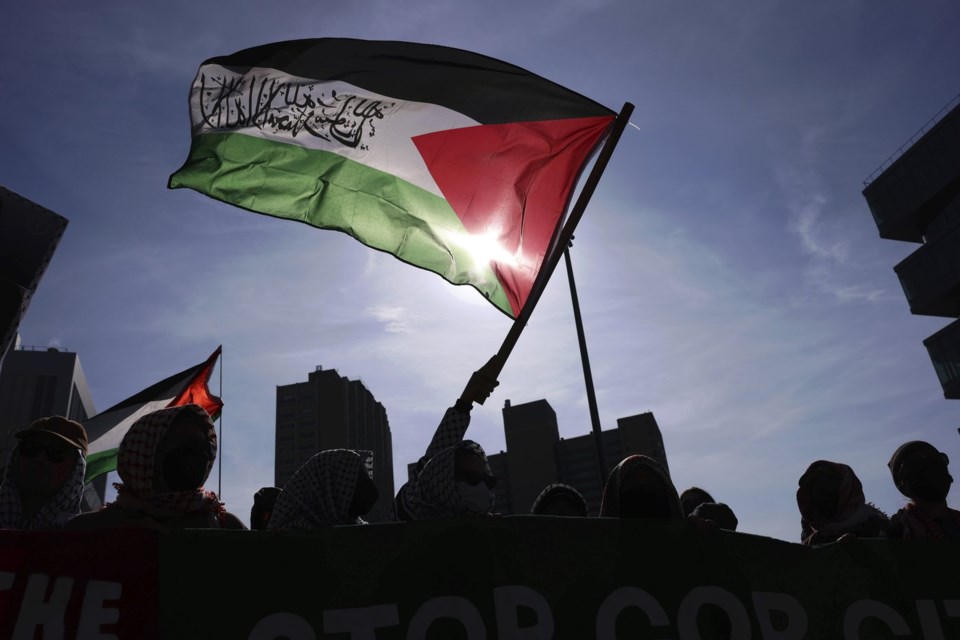When President Donald Trump of foreign students who participated in ŌĆ£pro-jihadistŌĆØ protests of the war in Gaza, some supporters of the crackdown were already working to identify targets for expulsion.
Here are some key takeaways about the efforts by pro-Israel private groups to expose protesters using facial recognition and other means, and to report them to federal authorities.
Private groups experiment with facial recognition to identify protesters
A right-wing Jewish group said it used facial-recognition software to identify campus protesters and included them on a list submitted to administration officials earlier this year, seeking deportation.
A New York computer engineer who has built a facial-recognition tool designed to identify masked protesters said he has talked with other pro-Israel groups about licensing the software for their own efforts.
The use of facial-recognition technology by private groups enters territory previously reserved largely for law enforcement, said attorney Sejal Zota, who represents a group of California activists in against facial-recognition company ClearviewAI.
ŌĆ£WeŌĆÖre focused on government use of facial recognition because thatŌĆÖs who we think of as traditionally tracking and monitoring dissent,ŌĆØ Zota said. But ŌĆ£there are now all of these groups who are sort of complicit in that effort.ŌĆØ
Other groups call on members to report protesters
Some private groups have urged their followers to report protesters to immigration authorities, heightening the potential consequences.
ŌĆ£Please tell everyone you know who is at a university to file complaints about foreign students and faculty who support Hamas,ŌĆØ Elizabeth Rand, president of a group called Mothers Against Campus Antisemitism, said in a Jan. 21 post to more than 60,000 followers on Facebook that included a link to an ICE tip line. She did not respond to messages seeking comment.
Efforts to identify protesters stir anxiety among foreign students
ItŌĆÖs unclear whether names from outside groups have reached top government officials, who have said that more arrests of international students are coming. But concern about the pursuit of activists has risen since the March 8 , a Columbia University graduate student of Palestinian descent who helped lead demonstrations against IsraelŌĆÖs conduct of the war.
ŌĆ£Now theyŌĆÖre using tools of the state to actually go after people,ŌĆØ said a Columbia graduate student from South Asia who has been active in protests and spoke on condition of anonymity because of concerns about losing her visa.
What activities could cost students their visas?
Some supporters of deportation say theyŌĆÖre focused on students whose activities go beyond protest, pointing to those who incite violence or illegally.
ŌĆ£If youŌĆÖre here, right, on a student visa causing civil unrest ... assaulting people on the streets, chanting for peopleŌĆÖs death, why the heck did you come to this country?ŌĆØ said Eliyahu Hawila, the software engineer whose company built the tool designed to identify masked protesters.
But an Arab-American advocate said he worries that groups bent on exposing pro-Palestinian activists will make mistakes and single out students who did nothing wrong, potentially costing them the right to stay in the U.S.
The campaigns have taken ŌĆśdoxingŌĆÖ to a new level
The practice of unearthing and spreading personal information has become commonplace in the uproar over Gaza, used to harass both activists in the U.S. and Israeli soldiers who recorded video of themselves on the battlefield.
But the long-term consequences of such actions, known as doxing, were limited. The use of facial-recognition technology by private groups and calls to turn people in to immigration authorities significantly raises the stakes.
ŌĆ£ItŌĆÖs a very concerning practice. We donŌĆÖt know who these individuals are or what theyŌĆÖre doing with this information,ŌĆØ said Abed Ayoud, national executive director of the American-Arab Anti-Discrimination Committee. ŌĆ£Essentially the administration is outsourcing surveillance.ŌĆØ
Adam Geller, The Associated Press




